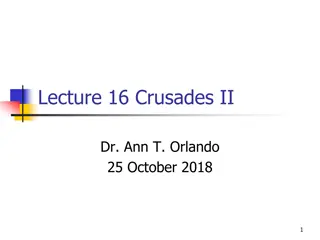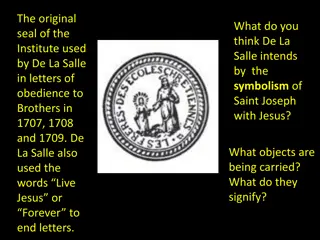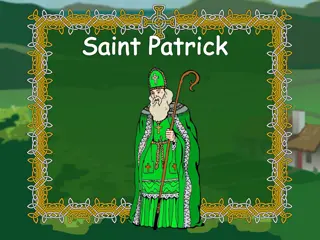Overview of Saint Joan - A Play by Bernard Shaw
Saint Joan is a play written by Bernard Shaw in 1923, depicting the story of Joan of Arc. The play explores Joan's journey from a humble farmer's daughter to a military leader inspired by divine visions. It also delves into the political and religious conflicts she faces, including her trial. The major characters include Joan of Arc, the Dauphin (later King Charles VII of France), the Inquisitor, and more. Shaw's meticulous research and historical sources enrich the narrative, leading to the play's success and even a film adaptation later on.
Download Presentation

Please find below an Image/Link to download the presentation.
The content on the website is provided AS IS for your information and personal use only. It may not be sold, licensed, or shared on other websites without obtaining consent from the author.If you encounter any issues during the download, it is possible that the publisher has removed the file from their server.
You are allowed to download the files provided on this website for personal or commercial use, subject to the condition that they are used lawfully. All files are the property of their respective owners.
The content on the website is provided AS IS for your information and personal use only. It may not be sold, licensed, or shared on other websites without obtaining consent from the author.
E N D
Presentation Transcript
SAINT JOAN Dr.Seema Singh Department of English HCPG College
Saint Joan is a play written by Bernard Shaw, premiering in 1923. Shaw had long been curious aboutJoan of Arc and had considered writing a play about her in 1913. In 1920, Joan was canonized by the Catholic Church, and her story received considerable attention. Inspired, Shaw decided to write a play telling Joan's story. Saint Joan was staged for the first time at the Garrick Theatre in New York in December of 1923. Winifred Lenihan played the title role. While writing the play, Shaw made use of the numerous historical sources, including transcripts of Joan's trial. In 1926, Shaw received the Nobel Prize for Literature. Shaw accepted the prize but declined the accompanying prize money. In 1957, the play was adapted into a film directed by Otto Preminger and starring Jean Seberg.
Major Characters of Saint Joan Major Characters of Saint Joan Joan of Arc : Joan is the protagonist of the play. She is born the daughter of a humble farmer, but, inspired by divine visions, she becomes an important military leader . The Dauphin (Later King Charles VII of France) : Charles is the expected heir to the French throne (hence the title "Dauphin"), but at the start of the play, he has not been officially crowned and has been declared illegitimate. With Joan's help, Charles is crowned as Charles VII and goes on to become a good leader. The Inquisitor (Brother John Lemaitre) : A French monk who plays a key role in Joan's trial. Peter Cauchon, Bishop of Beauvais : Cauchon is a Frenchman but is part of the Burgundian faction, which means he is allied to the English. He works with Warwick to ensure that Joan will be turned over to the English I f she is captured. Richard de Beauchamp, Earl of Warwick : An English nobleman and Joan s primary opponent on the English side of the war. Though not nearly as concerned about Joan s heresy against the Church as he pretends, Stogumber (the Chaplain) :An English priest who acts as chaplain to the Cardinal of Winchester and the Earl of Warwick. . The Gentleman from 1920 :A man dressed in clothing of the 1920s who appears in the epilogue. He has traveled back in time to 1456 to tell the other characters that Joan will eventually be canonized as a saint.
Scene 1 The play opens on a spring morning in the year 1429 in the castle of Vaucouleurs, in France. Captain Robert de Baudricourt is expressing his annoyance to his steward because his hens are not laying eggs. The Steward tells his master that until Robert agrees to meet with "the Maid" (a nickname for Joan), the chickens and cows will not return to their normal behavior. Joan has been waiting for two days to see Robert. In the meantime, she has been spending time with the soldiers and praying. Robert has urged his steward to send her away, but the steward has not done so. He notes that Joan seems full of courage and conviction, which works to motivate the people around her. Frustrated, Robert calls out from the window, telling Joan to come up. While he waits for her, the steward explains that Joan has come to the castle seeking armor and a sword so that she can be attired like a soldier. Joan enters the room and calmly tells Robert that she wants a horse, armor, and some soldiers. She is going to seek a meeting with the Dauphin (the term for the French heir to the throne). Robert responds by telling Joan that her requests are outrageous, but she reacts calmly and explains that God will change his mind, just as God has led him to finally meet with her. She also explains that the items she requests are necessary because she is going to break the siege of Orleans (a French city besieged by English troops). Robert is shocked at Joan's plan, but she simply explains that she has already persuaded three of Robert's soldiers to go with her, including a man named Polly (a nickname for Bertrand de Poulengy). Joan is confident that if Robert helps her, he will go to Heaven after his death, and she mentions speaking with Saint Catherine and Saint Margaret. Robert orders Joan out of the room so that he can confer privately with Bertrand de Poulengy. When Poulengy enters, Robert explains his assumption: Robert explains that Joan is not a simple country girl: Poulengy, however, rejects Robert's theory, explaining that he and his men are genuinely Inspired by Joan. France is in a desperate situation: the Dauphin is not an effective leader, and now his own mother is denying that he is the legitimate heir. Poulengy feels that unless a miracle takes place, Orleans is going to be lost to the English. He offers to pay for Joan's horse himself.
Robert de Baudricourt :A French nobleman who gives Joan soldiers and arms so that she can travel to the Dauphin. Robert's Steward : A household servant who encourages Robert to meet with Joan. Bertrand de Poulengy: A French nobleman and soldier who is friends with Robert de Baudricourt. He believes in Joan and offers to go with her to the Dauphin. Georges, Duc de la Tremouille, Constable of France: A French nobleman who is close to the Dauphin. Regnault de Chartres, the Archbishop of Rheims :A French Churchman who crowns Charles as King and later rebukes Joan for being proud and stubborn. Gilles de Rais (Bluebeard) :A French nobleman and military leader. Captain La Hire : A French soldier who strongly believes in Joan. Duchess de la Tremouille : A French noblewoman and the wife of Tremouille. Jean, Comte de Dunois, Bastard of Orleans : A French military leader who is in charge of the attack of Orleans. John d'Estivet, Canon of Bayeux : A French Church official who plays a key role in Joan's trial. Thomas de Courcelles, the Canon of Paris : A French church official involved in Joan's trial. Brother Martin Ladvenu : A monk present at Joan's trial; he will go on to become a strong advocate to have her reputation restored.
Scene 1 Robert calls Joan back in and asks her about what it is like when she hears the voices of the saints. Joan doesn't give many details but insists that the messages she receives are genuinely God's plan. God has told her that it is her destiny to end the siege of Orleans , see the Dauphin crowned at Rheims Cathedral, and eventually drive the English out of France altogether. Joan does not think the English are inherently bad, but she believes they have been given their own lands to rule over, and that it is a sin to try to seize lands that belong to other people, who speak a different language. Robert insists that a soldier's obligation is to serve his lord and commander, but Joan counters by arguing that a man's highest obligation is to God. Robert tries to frighten Joan by referring to the fierceness of English soldiers. Joan is unimpressed; she got to know three wounded English soldiers in her home village of Domremy. She also argues that if the French soldiers were truly inspired by the right leader and believed they were fighting in service of God and their country, they would be more successful. Robert tells Polly that he sees some merit to this argument: he is still suspicious of Joan, but she might be able to inspire the soldiers, and, more important, the Dauphin. He agrees to give Joan the things she has asked for, and he tells her to go with Polly and the other soldiers to see the Dauphin. Polly wonders how Joan will get access to the Dauphin, but Robert responds that she was able to get an audience with him. Joan leaves in excitement, followed by Polly. When Robert is alone, the steward returns with a basket of eggs. The hens have started laying again. Robert wonders if everything Joan has said could actually be true.
Scene 2 Scene 2 is set on March 8, 1429, in the French city of Chinon. The Archbishop of Rheims and the Lord Chamberlain, Monseigneur de la Tremouille, are talking, and the latter is complaining that the Dauphin owes him money. The Archbishop notes that he is also owed money, and he speaks of the Dauphin in a disrespectful way. The entrance of another nobleman, Monsieur de Rais (nicknamed Bluebeard), is announced. Bluebeard enters the room and asks the two other men if they have seen someone named La Hire. Tremouille sarcastically comments that La Hire might have sworn himself to death since he is known for cursing excessively. Bluebeard points out that someone else, nicknamed Foul-Mouthed Frank, was warned to stop swearing because he was close to death. Shortly after receiving this warning, Frank fell down a well and died. The group is interrupted by the entrance of Captain La Hire, who explains that Frank's death was forewarned by an angel. The angel (whom an audience knows to be Joan) has advanced all the way to Chinon with only a small group of soldiers and has successfully avoided any battles. A servant breaks in to make another announcement: the Dauphin is arriving. The Dauphin has a letter from Robert de Baudricourt, which he tries to show to the Archbishop. The Archbishop is not interested in the letter and while La Tremouille struggles to read it out aloud, the Dauphin (Charles) and the Archbishop bicker. Charles admits that he owes money and is not skilled at warfare, but he insists he should get more respect because of his royal blood. He wants to know why the Archbishop hasn't called on saints and angels to help him with his cause. Confused, the Archbishop snatches up the letter and reads it. He complains that Robert has simply sent a crazy young woman and that Charles should not even see her. In fact, if she is wearing men's clothing and spending time with soldiers, she must not even be a respectable woman. Charles insists that Robert is sending him a saint, which signals his status and right as a king.
By this point, La Hire has realized that the girl Robert is writing about must be the same "angel" who predicted Frank's death, and he becomes excited about this evidence of her miraculous powers. While everyone gets increasingly locked into an argument about Joan, Bluebeard suggests a test. He will dress up like the Dauphin to try to fool Joan. If she knows he is the wrong man, this will be evidence that she truly is sent from God. Charles becomes warrier, but he is still tempted by the idea of Joan helping with the siege of Orleans. The situation is becoming direr every day: Jack Dunois (nicknamed the Bastard) is in charge of the French troops at Orleans, and while he is a skilled leader, the winds are making it impossible for him to sail upriver to the position he needs to occupy. By this point, La Hire and La Tremouille are both urging for Joan to be given a chance, and the Archbishop reluctantly reconsiders. He finally agrees to test . Bluebeard and Charles go off to prepare for their plot, and La Tremouille and the Archbishop discuss what they think will happen. The Archbishop reveals himself to be a somewhat shrewd and cynical man: he explains that Joan will know, based on questioning and research, who the Dauphin is, but that this will appear to be a miracle in other people's eyes. The scene shifts to a gathering of the whole court, where Bluebeard is posing as the Dauphin and the Duchess of Tremouille is posing as his wife. Joan enters, dressed in men's clothing and wearing her hair very short. Her appearance prompts the Duchess to mock her, but Joan is unfazed and asks where the Dauphin is. Bluebeard says that he is the Dauphin, but Joan makes it clear she doesn't believe this. She looks around the room and easily identifies Charles as the true Dauphin. She tells Charles of her plan to help him be crowned and Charles tells her she has to first consult with the Archbishop. Joan approaches the Archbishop and falls to her knees, asking him to bless her. He is moved by her piety, and when Joan asks to be alone with Charles, he agrees, telling everyone that Joan has been sent by God. Alone with Charles, Charles explains that he has no desire for power or authority; he would just like to be left alone to live a quiet life, and he would prefer to end the war by diplomacy rather than war. He has no interest in trying to portray a kingly image, but Joan insists he needs to assert his authority. The tension mounts between the two as Joan mentions Charles's young son, and Charles replies bitterly that he doesn't like or trust his own son. However, Joan finally persuades Charles that he needs to fulfill God's will by displaying leadership. Charles summons the other lords back and tells them that Joan is now in charge of the army. Although La Tremouille complains, everyone else pledges their allegiance to Joan.
Scene 3 The next scene opens on April 29, 1429, just outside of the city of Orleans. Dunois (also nicknamed the Bastard) is the leader of the French forces, and he paces back and forth on the banks of the River Loire, accompanied by his page. Dunois is frustrated because the wind is blowing east, but he needs a west wind in order to be able to sail upriver of the English forces and get into a strategic position. Joan arrives, dressed in armor. She is angry because she has been taken to the riverbank opposite to Orleans. Dunois explains why: the bridge that would allow them to cross the river and mount an attack is closely guarded by English soldiers. Dunois is impressed with Joan, although he's also curious about her status as a woman engaging in warfare. Joan brusquely explains that she is not like other women and is not interested in the same things they are. She turns the conversation back to military strategy, advocating for an aggressive assault on English forces. Dunois, however, explains that the only possible tactic involves sailing upriver and then attacking from behind. Joan states that she will ask God to send a west wind, and, within moments, the wind starts to blow. Dunois is awe-struck and kneels before her, proclaiming her the commander of French forces. The troops begin to move upriver, eager to mount an attack.
Scene 4 The scene then shifts to a tent in the English camp. An English nobleman (later introduced as Richard de Beauchamp, the Earl of Warwick) is reading, accompanied by his chaplain (John Boyer Spencer de Stogumber). Warwick calmly discusses the pleasures of books and reading, but de Stogumber interrupts to complain about the recent defeats suffered by English forces. With Joan leading the French, there have been massive defeats at Orleans and other places. Warwick points out that, amidst these military tensions, men are becoming more and more likely to take on a national identity (as French or English). He is distrustful of this change because he thinks it will make it harder for the Church and the nobility to maintain their hold on power. Cauchon arrives in the tent, and Warwick explains that Charles is about to be crowned at Rheims. De Stogumber angrily explains that Joan's witchcraft must be responsible for the sudden rise in French victories. Cauchon disagrees, acknowledging that Dunois is an excellent commander and that the French troops may be winning honestly.He also questions whether Cauchon might be siding with Joan, but Cauchon points out that he would not be meeting with the English if he were. Cauchon also explains that he thinks Joan has become a tool of the Devil, and that, as a clergyman, he feels an obligation to try to save her soul. However, he is insistent that she is a heretic and not a witch. Warwick doesn't seem to care about this distinction he just wants to know that Joan is going to be burnt. Cauchon is not interested in what he sees as the political schemes of the nobility: he wants to do everything in his power to save Joan's soul. De Stogumber accuses Cauchon of being a traitor, and Cauchon accuses de Stogumber of putting his loyalty to his country ahead of his loyalty to God. De Stogumber is concerned about accusing Joan of heresy when she is deeply pious and constantly praying. Cauchon reveals part of why he is angry with Joan: by claiming she can speak directly with God, she reduces the power and authority of the Church, which is supposed to exist as an intermediary between God and the people.
Scene 5 The scene opens in Rheims Cathedral, where Joan is praying. Dunois enters and tells her that the crowd is calling for her, but she explains that she doesn't want to take away from the King's glory on the day of his coronation.Once they've taken Paris, she just wants to go back to the country. Dunois cautions her that she might not be allowed to lead an attack on Paris, and he also explains that he's uncomfortable when she talks about her voices. Charles enters with Bluebeard and La Hire, complaining that he found the experience of the coronation unpleasant. Joan announces that now that Charles is crowned, she is going to return to her home, but she is disappointed when Charles seems relieved to hear this. She asks both Dunois and La Hire to continue to fight to drive the English out entirely. Then, Joan abruptly announces that she wants to take Paris before she goes home. Charles doesn't like this idea since he is tired of fighting. When the Archbishop joins the group, Charles explains Joan's proposition about Paris to him. Joan defiantly insists that she knows what is best, since God tells her, even when the Archbishop questions whether she might simply be proud and stubborn. The argument about attacking Paris becomes more heated: La Hire sides with Joan, but Dunois disagrees. He respects what Joan has contributed to the war efforts, but he also thinks she is reckless. Attacking Paris would mean being seriously outnumbered: if Joan insists on doing so, he won't risk his soldiers to help her, and she will end up captured. Surprisingly, the Archbishop takes this opportunity to say that the Church would also not come to her aid: in fact, it would likely burn her for witchcraft. He wouldn't advocate for her because he thinks she is guilty of pride. Joan realizes that she will be abandoned if she is captured by the English, but she remains defiant, explaining that she will put all of her trust in God. Joan exits; the men reflect on how they feel somewhat badly about this, but they need to stand by their priorities.
Scene 6 Warwick and his page are sitting in a room in a castle, in the French city of Rouen. The page mentions that a Church trial is taking place, and Warwick sends the page to find Cauchon. Cauchon enters, accompanied by a monk named John Lemaitre and a canon (a position in the Church hierarchy) named John D'Estivet. Both men have roles in the trial: Lemaitre is acting as the Inquisitor, and D'Estivet has a role called the Promoter (similar to a prosecuting attorney). Joan was taken prisoner at Compiegne by the Burgundian forces, and Warwick then paid for her to be transferred to Church authorities. Cauchon says that he is determined that Joan will have a fair trial, rebuking Warwick for threatening anyone who sides with Joan. Nonetheless, Lemaitre is certain that Joan is going to get convicted. Warwick makes it clear that he needs Joan dead, and that if the Church won't convict her, he will act independently. He then leaves, and Cauchon, D'Estivet, and Lemaitre set up for the trial, discussing how the Church is different from the nobility. As the churchmen bicker over the nature of what Joan has been guilty of, the Inquisitor (Lemaitre) gives a long speech explaining why heresy is such a grave sin. He also explains that the trial is ultimately a merciful process. . Joan enters. She complains that she is being held by the English, and she is resentful of the care they take to prevent her escape. D'Estivet counters, arguing that before she was imprisoned, she jumped from a tower and tried to escape. He sees this escape attempt as evidence of her heresy. Joan refuses to be sworn in, and Courcelles suggests she be tortured to ensure she speaks the truth during the trial. The others disagree, and the trial proceeds. Joan is stubborn, refusing to swear loyalty to the Church over her voices, and further refusing to cease wearing men's clothes. Finally, Ladvenu tells Joan that if she doesn't repent, she will be burnt at the stake. This threat frightens Joan, who claims her voices have promised her that she will not be burnt. She expresses a willingness to recant, and Ladvenu prepares a confession for her to sign. While de Stogumber expresses his anger at the prospect of Joan not being executed, the confession is read out. It expresses penitence for dressing like a man, pretending to hear voices, and generally disobeying the authority of the Church. Joan signs it. Lemaitre explains that now her soul is saved, and she will spend the rest of her life in prison. Joan is horrified: she assumed a recantation meant that she could go free, and she argues passionately that a life in prison is no life at all. She rips up the recantation. Cauchon and Lamaitre now stand confirmed that she is a heretic; de Stogumber calls for Joan to be taken to the fire immediately. Everyone rushes off to see the execution, leaving Cauchon and Lemaitre alone. Lamaitre expresses his sadness that Joan will die without ever understanding what was wrong with her beliefs. Warwick joins them, and then Cauchon and Lemaitre go to watch the execution. A short time later, de Stogumber comes back in a state of agitation. He is horrified by what he witnessed at the execution. He tells Warwick that an English soldier made a small cross out of sticks for Joan. Ladvenu comes back as well, explaining that he tried to hold up a cross for Joan to look at. He feels awful that Joan died an innocent. De Stogumber flees, crying out that his guilt is going to drive him to suicide. Ladvenu follows behind him.The Executioner enters and tells Warwick that Joan's ashes and her heart have been dumped into the river so that people will not memorialize her. Warwick suggests that Joan's memory will still live on.
Epilogue Epilogue The epilogue opens on a June night in 1456. King Charles is in bed, reading, and is startled when Ladvenu abruptly enters the room. Ladvenu is eager to announce that Joan's name has finally been cleared. Charles expresses his relief: restoring Joan's reputation also legitimizes his own reign. Charles also cynically points out that if Joan were to come back to life, people would just burn her again. Ladvenu leaves the room in anger. Suddenly, a vision of Joan appears. Charles proudly reports to her that he has become good at warfare, and also that the men involved in her trial have been found to be corrupt. Joan points out that she was still burnt, and she seems unmoved by this news. Cauchon appears in the dream vision as well, explaining that after his death, his body was dug up, excommunicated, and desecrated.Dunois appears, explaining that he is still alive, but is present in spirit. He kept his promise to Joan, driving out the English, and he also argued in favor of her case being retried. Another common soldier joins them, singing. He is the soldier who gave Joan a cross during her execution; even though he went to Hell after his death, this one action allows him to have one day every year when he can leave Hell. De Stogumber joins them, explaining that after witnessing Joan's execution he became a humble preacher and dedicated his life to good works. A Gentleman enters, wearing clothes from the 1920s. The medieval characters laugh at his strange clothing, but he focuses on delivering his message that Joan has been declared a saint. Visions of statues being raised in her honor, in both France and England, appear, and Joan feels happy. With everyone praising her, Joan asks if she ought to come back to life. Quickly, everyone tells her that this is a terrible idea. All of the other men vanish, leaving Joan alone with the common soldier. He reassures her not to listen to powerful people and to be true to herself. Then, a bell chimes, summoning him back to Hell. Joan is left alone; she wonders aloud when Earth will be ready to receive God's saints.


![❤[PDF]⚡ Civil War Talks: Further Reminiscences of George S. Bernard and His Fel](/thumb/20551/pdf-civil-war-talks-further-reminiscences-of-george-s-bernard-and-his-fel.jpg)




















